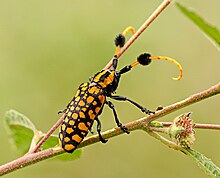Longhorn beetle
| Cerambycidae | |
|---|---|
 | |
Batus barbicornis | |
Scientific classification | |
| Kingdom: | Animalia |
| Phylum: | Euarthropoda |
| Class: | Insecta |
| Order: | Coleoptera |
| Superfamily: | Chrysomeloidea |
| Family: | Cerambycidae Latreille, 1802 [1] |
| Subfamilies | |
Ten; see text | |
The longhorn beetles (Cerambycidae; also known as long-horned or longhorn beetles or longicorns) are a cosmopolitan family of beetles,[2] typically characterized by extremely long antennae, which are often as long as or longer than the beetle's body. In various members of the family, however, the antennae are quite short (e.g., Neandra brunnea) and such species can be difficult to distinguish from related beetle families such as the Chrysomelidae. The family is large, with over 26,000 species described, slightly more than half from the Eastern Hemisphere. Several are serious pests. The larvae, called roundheaded borers, bore into wood, where they can cause extensive damage to either living trees or untreated lumber (or, occasionally, to wood in buildings; the old-house borer, Hylotrupes bajulus, is a particular problem indoors). A number of species mimic ants, bees, and wasps, though a majority of species are cryptically colored. The rare titan beetle (Titanus giganteus) from northeastern South America is often considered the largest (though not the heaviest, and not the longest including legs) insect, with a maximum known body length of just over 16.7 cm (6.6 in).[3]
The scientific name of this beetle family goes back to a figure from Greek mythology: after an argument with nymphs, the shepherd Cerambus was transformed into a large beetle with horns.
Contents
1 Classification
1.1 Subfamilies
2 Notable genera and species
3 See also
4 References
5 Further reading
6 External links
Classification

Decora longicorn (Amphirhoe decora)
As with many large families, different authorities have tended to recognize many different subfamilies, or sometimes split subfamilies off as separate families entirely (e.g., Disteniidae, Oxypeltidae, and Vesperidae);[4] there is thus some instability and controversy regarding the constituency of the Cerambycidae.[5] There are few truly defining features for the group as a whole, at least as adults, as there are occasional species or species groups which may lack any given feature; the family and its closest relatives, therefore, constitute a taxonomically difficult group, and relationships of the various lineages are still poorly understood.[6]

Gerania bosci

Anoplophora chinensis
Subfamilies
The ten subfamilies are:[7]
Anoplodermatinae Guérin-Méneville, 1840
Apatophyseinae Lacordaire, 1869
Cerambycinae Latreille, 1802
Dorcasominae Lacordaire, 1869
Lamiinae Latreille, 1825
Lepturinae Latreille, 1802
Necydalinae Latreille, 1825
Parandrinae Blanchard, 1845
Prioninae Latreille, 1802
Spondylidinae Audinet-Serville, 1832
Notable genera and species

Common tuft bearing longhorn beetle (Aristobia approximator)
Moneilema – cactus longhorn beetles
Anoplophora chinensis – citrus long-horned beetle- Phymatodes nitidus
Anoplophora glabripennis – Asian long-horned beetle
Tetraopes tetrophthalmus – red milkweed beetle
Tetropium fuscum – brown spruce longhorn beetle, a major Canadian pest
Desmocerus californicus dimorphus – valley elderberry longhorn beetle
Petrognatha gigas – giant African longhorn beetle
Rosalia alpina – Rosalia longhorn beetle
Aridaeus thoracicus – tiger longicorn (Australia)
Prionoplus reticularis - huhu beetle
See also
- List of longhorn beetle (Cerambycidae) species recorded in Britain
References
^ "Cerambycidae Latreille, 1802". Integrated Taxonomic Information System. Retrieved June 6, 2011..mw-parser-output cite.citationfont-style:inherit.mw-parser-output .citation qquotes:"""""""'""'".mw-parser-output .citation .cs1-lock-free abackground:url("//upload.wikimedia.org/wikipedia/commons/thumb/6/65/Lock-green.svg/9px-Lock-green.svg.png")no-repeat;background-position:right .1em center.mw-parser-output .citation .cs1-lock-limited a,.mw-parser-output .citation .cs1-lock-registration abackground:url("//upload.wikimedia.org/wikipedia/commons/thumb/d/d6/Lock-gray-alt-2.svg/9px-Lock-gray-alt-2.svg.png")no-repeat;background-position:right .1em center.mw-parser-output .citation .cs1-lock-subscription abackground:url("//upload.wikimedia.org/wikipedia/commons/thumb/a/aa/Lock-red-alt-2.svg/9px-Lock-red-alt-2.svg.png")no-repeat;background-position:right .1em center.mw-parser-output .cs1-subscription,.mw-parser-output .cs1-registrationcolor:#555.mw-parser-output .cs1-subscription span,.mw-parser-output .cs1-registration spanborder-bottom:1px dotted;cursor:help.mw-parser-output .cs1-ws-icon abackground:url("//upload.wikimedia.org/wikipedia/commons/thumb/4/4c/Wikisource-logo.svg/12px-Wikisource-logo.svg.png")no-repeat;background-position:right .1em center.mw-parser-output code.cs1-codecolor:inherit;background:inherit;border:inherit;padding:inherit.mw-parser-output .cs1-hidden-errordisplay:none;font-size:100%.mw-parser-output .cs1-visible-errorfont-size:100%.mw-parser-output .cs1-maintdisplay:none;color:#33aa33;margin-left:0.3em.mw-parser-output .cs1-subscription,.mw-parser-output .cs1-registration,.mw-parser-output .cs1-formatfont-size:95%.mw-parser-output .cs1-kern-left,.mw-parser-output .cs1-kern-wl-leftpadding-left:0.2em.mw-parser-output .cs1-kern-right,.mw-parser-output .cs1-kern-wl-rightpadding-right:0.2em
^ Gomes Gonçalves, Marcos Paulo (December 2017). "Relationship Between Meteorological Conditions and Beetles in Mata de Cocal". Revista Brasileira de Meteorologia. 32 (4): 543–554. doi:10.1590/0102-7786324003. ISSN 0102-7786.
^ Max Barclay (2010). "Titanus giganteus Linnaeus (1771)". Natural History Museum. Retrieved June 6, 2011.
^ Sergio Antonio Vanin & Sergio Ide (2002). "Classificação comentada de Coleoptera" [An annotated classification of the Coleoptera]. In C. Costa; S. A. Vanin; J. M. Lobo & A. Melic. Proyecto de Red Iberoamericana de Biogeografía y Entomología Sistemática PrIBES 2002 (PDF). Monografias Tercer Milenio (M3M) (in Portuguese). 3. pp. 193–206. ISBN 84-922495-8-7.
^ Miguel A. Monné (2006). "Catalogue of the Cerambycidae (Coleoptera) of the Neotropical Region. Part III. Subfamilies Parandrinae, Prioninae, Anoplodermatinae, Aseminae, Spondylidinae, Lepturinae, Oxypeltinae, and addenda to the Cerambycinae and Lamiinae" (PDF excerpt). Zootaxa. 1212: 1–244. ISBN 1-877407-96-8.
^ Arnett, et al. (2002). American Beetles, Vol. 2. CRC Press, 861 pp.
^ Patrice Bouchard; Yves Bousquet; Anthony E. Davies; Miguel A. Alonso-Zarazaga; John F. Lawrence; Chris H. C. Lyal; Alfred F. Newton; Chris A. M. Reid; Michael Schmitt; S. Adam Ślipiński; Andrew B. T. Smith (2010). "Family-group names in Coleoptera (Insecta)". ZooKeys. 88: 1–972. doi:10.3897/zookeys.88.807. PMC 3088472. PMID 21594053. Archived from the original on 2011-07-21.
Further reading
- Monné, Miguel A. & Hovore, Frank T. (2005) Electronic Checklist of the Cerambycidae of the Western Hemisphere. PDF Cerambycids.com
External links
| Wikimedia Commons has media related to Cerambycidae. |
Wikispecies has information related to Cerambycidae |
Gallery Photo gallery of worldwide long-horned beetles- Photo gallery "Longhorn beetles (Cerambycidae) of the West Palaearctic Region"
CDFA Cerambycidae of the New World- Cerambycidae of French Guiana
National Museu, Rio, Brazil Holotype images
Iberodorcadion Coleoptera, Cerambycidae, Dorcadion - RedIRIS- VIDEOS - Longicornes (Dorcadion, Cerambycidae, Coleoptera)
- Cerambycidae of Borneo pdf
- BugGuide.net - Longhorned Beetles (Cerambycidae)
Anoplophora chinensis, citrus longhorned beetle on the University of Florida / Institute of Food and Agricultural Sciences Featured Creatures website
Coleoptera: Cerambycidae, University of Florida, Dept. of Entomology and Nematology- Wood-boring beetles of the World